Table of Contents[Hide][Show]
- Nutrivore Score for Sheep Milk – 210
- Sheep Milk Nutrition Facts
- Milk Nutrition Varies With Type
Health Benefits of Sheep Milk Nutrients+−
- Sheep Milk Provides 74% DV Vitamin B7 (Biotin)
- Sheep Milk Provides 72% DV Vitamin B12 (Cobalamin)
- Sheep Milk Provides 0.5 g of Conjugated Linoleic Acid (CLA)
- Sheep Milk Provides 67% DV Vitamin B2 (Riboflavin)
- Sheep Milk Provides 2.3 g of Medium Chain Triglycerides (MCTs)
- Sheep Milk Provides 36% DV Calcium
- Sheep Milk Provides 31% DV Phosphorus
- Sheep Milk Provides 14.7 g of Protein
- Sheep Milk Provides 21% DV Monounsaturated Fatty Acids (MUFAs)
- Sheep Milk Provides 20% DV Vitamin B5 (Pantothenic Acid)
- How Much Sheep Milk Should We Drink Per Day?
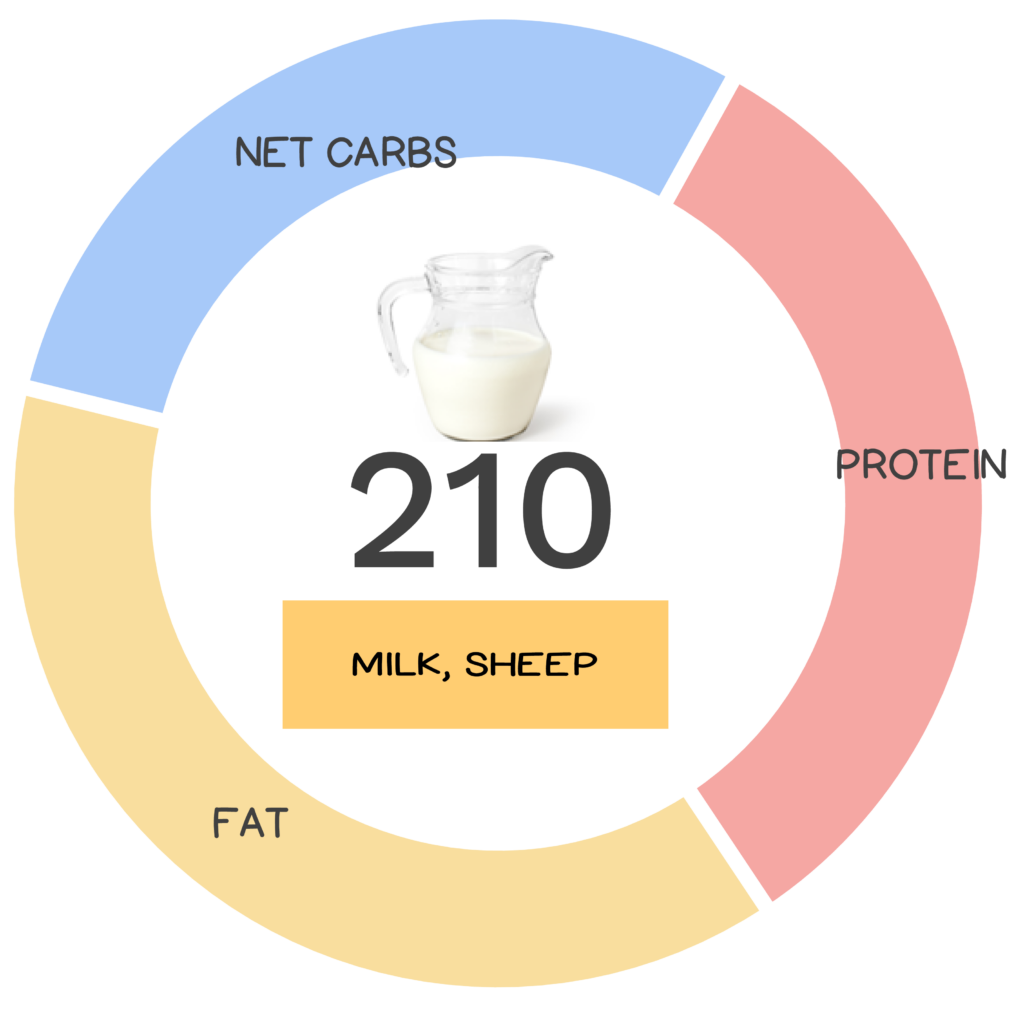
Milk is the liquid that is produced by mammary glands of mammals and is used to provide the majority (if not all) of the nutrients for their young before they can digest solid foods adequately. The milk created during lactation is typically filled with immune-modulating compounds and antibodies that fight off disease and strengthen the immune system of the vulnerable young baby.
Milk is not only filled with vitamins and minerals but contains immune-modulating components and even some antibodies that can help to develop and strengthen immune systems.
The discovery of milk as a food product outside of feeding infants happened organically following the domestication of animals in several different locations as early as 9000-7000 BC. Interestingly, the discovery happened in many different locations at the same time, all independent of each other’s discovery! Growing populations and the invention of the railway networks allowed milk production to rapidly expand across countries.
Milk is also filled with nutrients such as protein, lactose, calcium and many others, which is why it became popularized as a commodity in the global market. Milk is typically collected and shipped in liquid form, but can also be freeze-dried into powder, which allows for a more shelf-stable product, and can therefore be shipped all around the world. Milk is often fortified to supplement different cultural populations’ nutrient deficiencies (e.g., in North America, milk is commonly fortified with vitamins A and D). The largest global producers of milk are India, the European Union, and the United States.
Many cultures consume milk far beyond infancy by collecting, treating, and refrigerating it from a wide variety of animals including cows, sheep, goats, camel, horse, yak, ox, moose, reindeer and even buffalo. Swine (pigs) are also able to produce milk but are almost never used as the work is cumbersome and low yield. However, some pig farms produce high-priced pig cheese as a novelty! The majority of milk consumed globally is produced by cattle. Milk can also be processed into dozens of other dairy products, which makes it an extremely important commodity worldwide. Some of the products include cheese, yogurt, kefir, butter, and ice cream. Components of milk can be industrially separated to be used in other food products such as powdered milk, casein, whey protein, lactose, and condensed milk.
There are different fat levels, and therefore nutrition profiles of milk. The variety of milk and it’s nutrient profile depends on the breed of animal it was collected from and the amount of fat that is retained in the milk during processing (e.g., whole milk, skim milk, 1% milk, 2% milk, heavy cream etc.) Commercial milk can also undergo a variety of physical treatment steps to ensure it’s safety profile for consumption and transportation. Pasteurization heats the milk to kill harmful bacteria, with the side effect of reducing some of the nutrition. Filtration separates the different fat content layers of a milk product to impact the shelf life and the nutrition profile. Homogenization and creaming treatments can be done to prevent the fat layers from separating and produce a more palatable product. Ultra Heat Treatment (UHT) can be done on milk products to extend its unopened shelf life up to 6 months, but because of the high heat, this process significantly affects the amount of vitamins in the final product and does alter the taste as well.
While the benefits of raw milk are often espoused on a variety of platforms, the Centers for Disease Control and Prevention (CDC) warns that untreated (or “raw”) milk can contain harmful bacteria and germs that can pose a risk to those who drink it. Treatment such as pasteurization is very important to reduce the risk of serious illness.
This global commodity offers not only impressive yields and widespread availability, but is a great source of some amazing nutrients. Let’s clear the “whey” and head down the path of learning what makes milk a great choice!
Nutrivore Score for Sheep Milk – 210
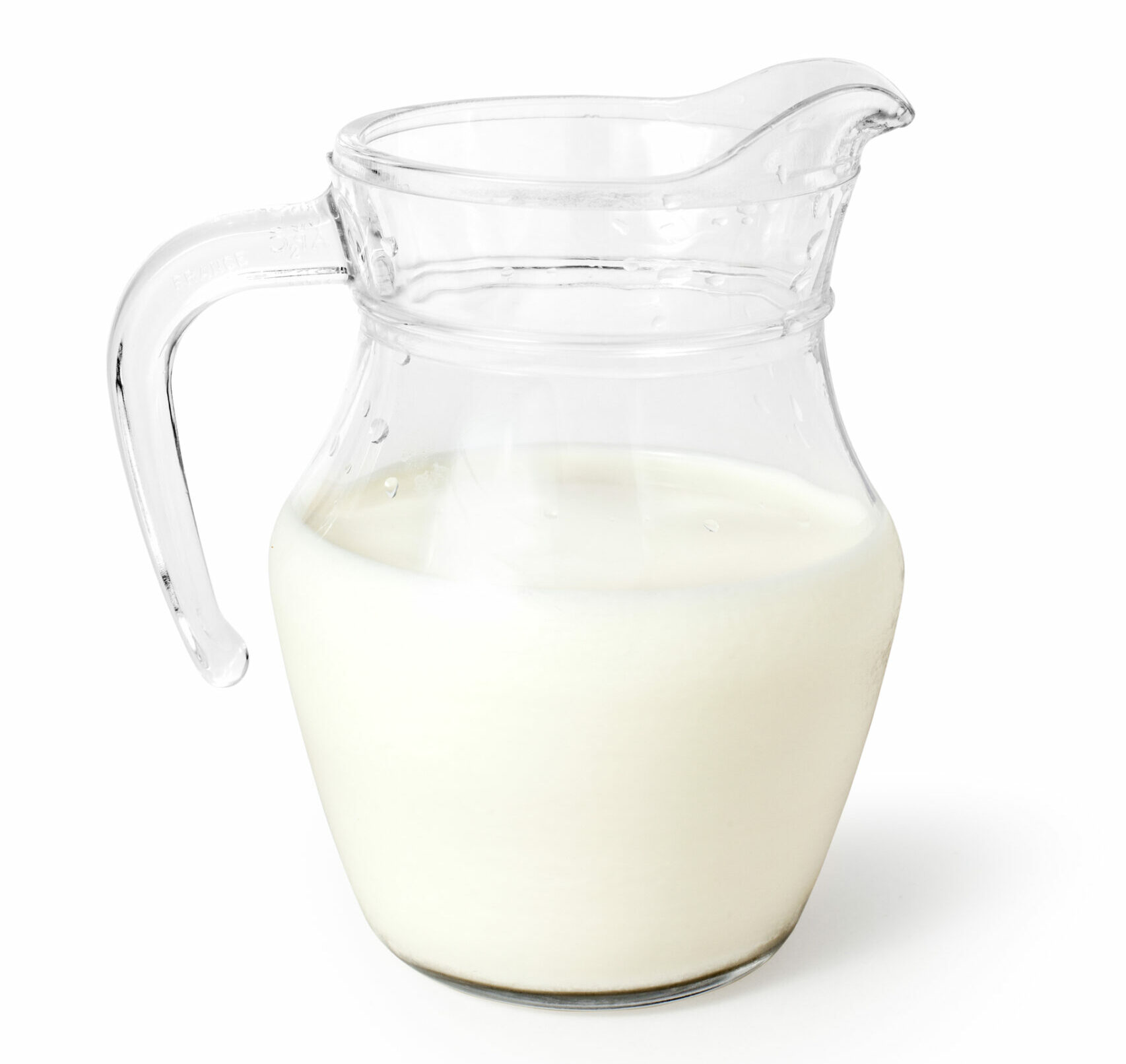
Sheep milk has a minimum Nutrivore Score of 210, making it a medium nutrient-dense food!
Per serving, sheep milk is a best source (>50% daily value) of conjugated linoleic acid (CLA), vitamin B2 (riboflavin), vitamin B7 (biotin), and vitamin B12 (cobalamin); an excellent source (20-50% daily value) of calcium, medium-chain triglycerides (MCTs), monounsaturated fatty acids (MUFA), phosphorus, protein, and vitamin B5 (pantothenic acid); and a good source (10-20% daily value) of alpha-linolenic acid (ALA), copper, magnesium, vitamin A, vitamin B1 (thiamin), vitamin C, and zinc.
Ditch Diets. Embrace Nutrients. Start with this FREE Guide.
Sign up for the free Nutrivore Newsletter, your weekly, science-backed guide to improving health through nutrient-rich foods — without dieting harder —and get the Beginner’s Guide to Nutrivore delivered straight to your inbox!

Sheep Milk Nutrition Facts
One serving of sheep milk is standardized to 1 cup or about 245 grams (8.6 ounces).
Sheep milk Nutrition Facts Per Serving
| Milk, sheep | Nutrivore Score: 2101 | Nutrient Density: Medium |
|---|---|---|
| Serving Size: 1 cup (245 grams) | Protein: 14.7 grams | Net Carbohydrates: 13.1 grams |
| Calories: 265 | Total Fat: 17.2 grams | Dietary Fiber: 0.0 grams |

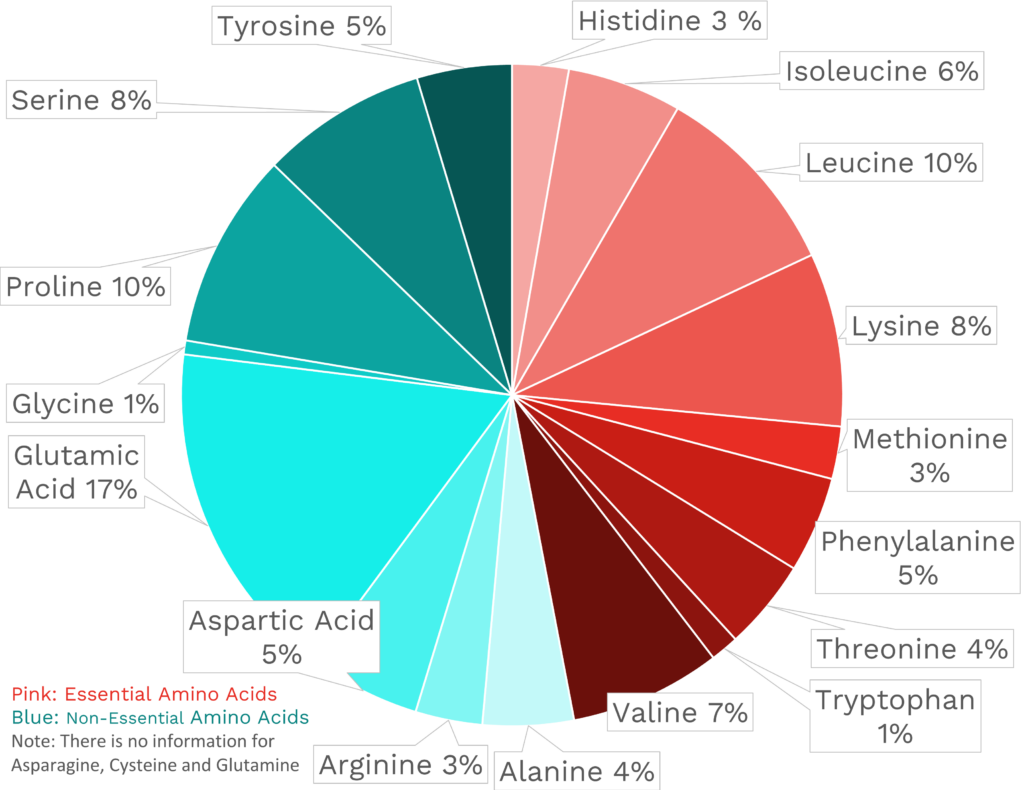
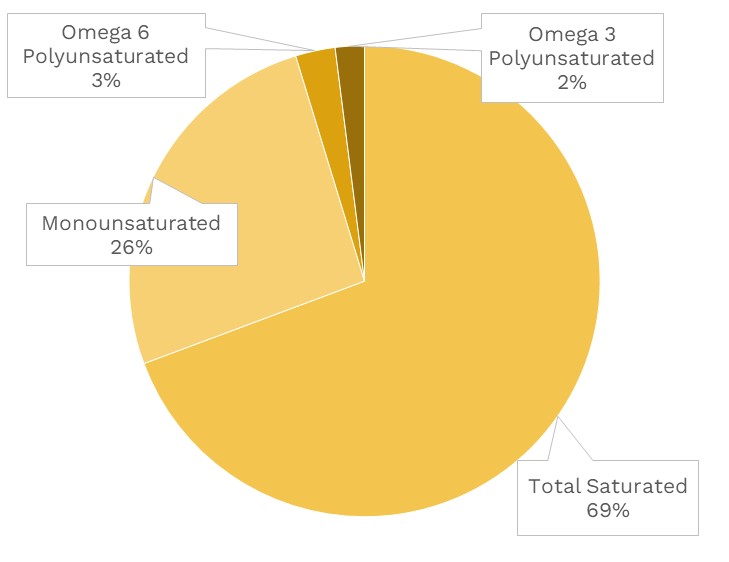
| VITAMINS | ||
|---|---|---|
| Vitamin A | 107.8 μg RAE | 12% DV |
| Vitamin B1 (Thiamin) | 159.3 μg | 13% DV |
| Vitamin B2 (Riboflavin) | 869.8 μg | 67% DV |
| Vitamin B3 (Niacin) | 1.0 mg | 6% DV |
| Vitamin B5 (Pantothenic Acid) | 1.0 mg | 20% DV |
| Vitamin B6 (Pyridoxine) | 147.0 μg | 9% DV |
| Vitamin B7 (Biotin) | 22.1 μg | 74% DV |
| Vitamin B9 (Folate) | 17.2 μg | 4% DV |
| Vitamin B12 (Cobalamin) | 1.7 μg | 72% DV |
| Vitamin C | 10.3 mg | 11% DV |
| Vitamin D (D2 + D3) | ~ | ~ |
| Vitamin E | ~ | ~ |
| Vitamin K | ~ | ~ |
| Choline | ~ | ~ |
| Myo-Inositol | ~ | ~ |
| CoQ10 | 0.1 mg | ~ |
| FUNCTIONAL FATS | ||
|---|---|---|
| MUFA | 4.2 g | 21% DV |
| ALA | 311.2 mg | 19% DV |
| EPA + DHA | ~ | ~ |
| CLA | 509.4 mg | ~ |
| Linoleic Acid | 0.4 g | 3% DV |
| MCT’s | 2.3 g | ~ |
| MINERALS | ||
|---|---|---|
| Calcium | 472.9 mg | 36% DV |
| Copper | 112.7 μg | 13% DV |
| Iodine | ~ | ~ |
| Iron | 0.2 mg | 1% DV |
| Magnesium | 44.1 mg | 11% DV |
| Manganese | 44.1 μg | 2% DV |
| Phosphorus | 387.1 mg | 31% DV |
| Potassium | 335.7 mg | 7% DV |
| Selenium | 4.2 μg | 8% DV |
| Sodium | 107.8 mg | 5% DV |
| Zinc | 1.3 mg | 12% DV |
| PHYTONUTRIENTS | ||
|---|---|---|
| Carotenoids | 0.0 μg | ~ |
| Polyphenols | 0.0 mg | ~ |
| Phytosterols | 0.0 mg | ~ |
| Glucosinolates | ~ | ~ |
| Thiosulfinates | ~ | ~ |
| Betalains | ~ | ~ |
| AMINO ACIDS & PEPTIDES | ||
|---|---|---|
| Taurine | 5.9 mg | ~ |
| Ergothioneine | ~ | ~ |
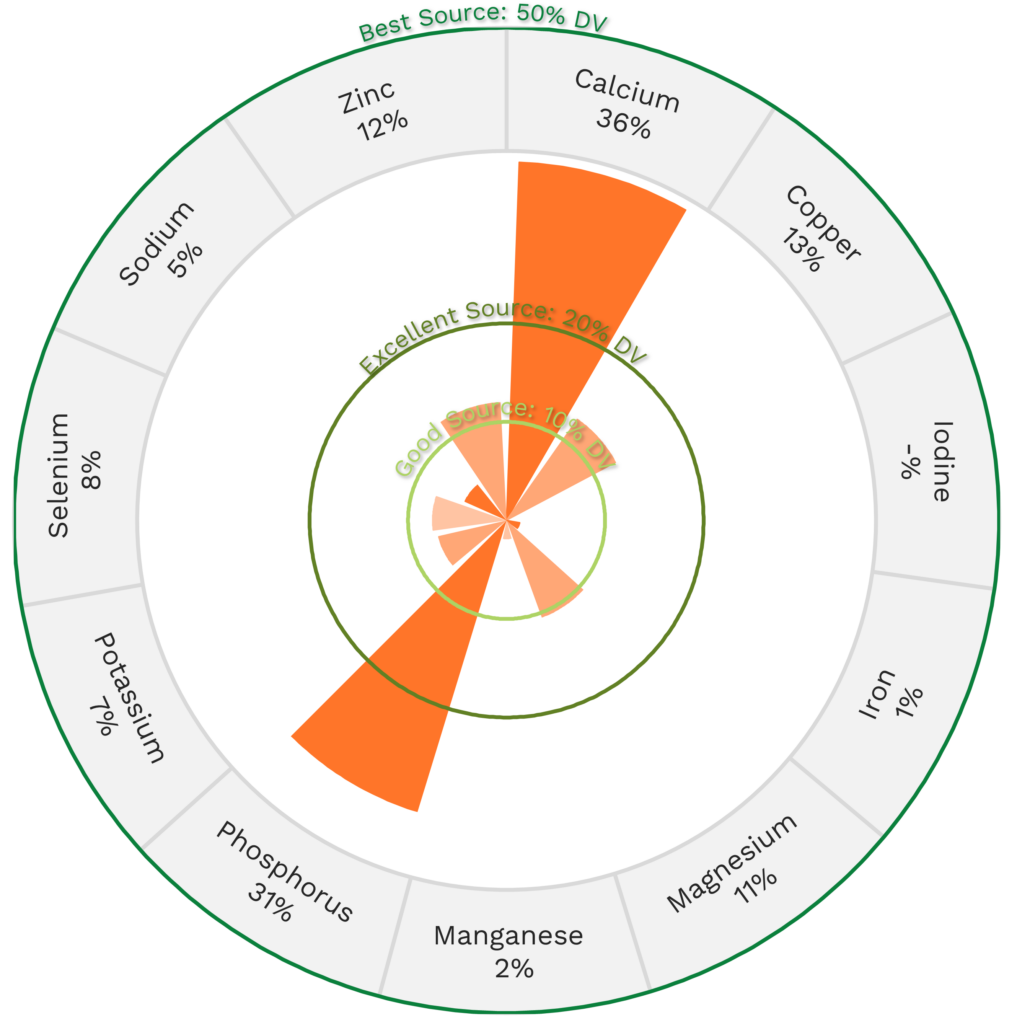
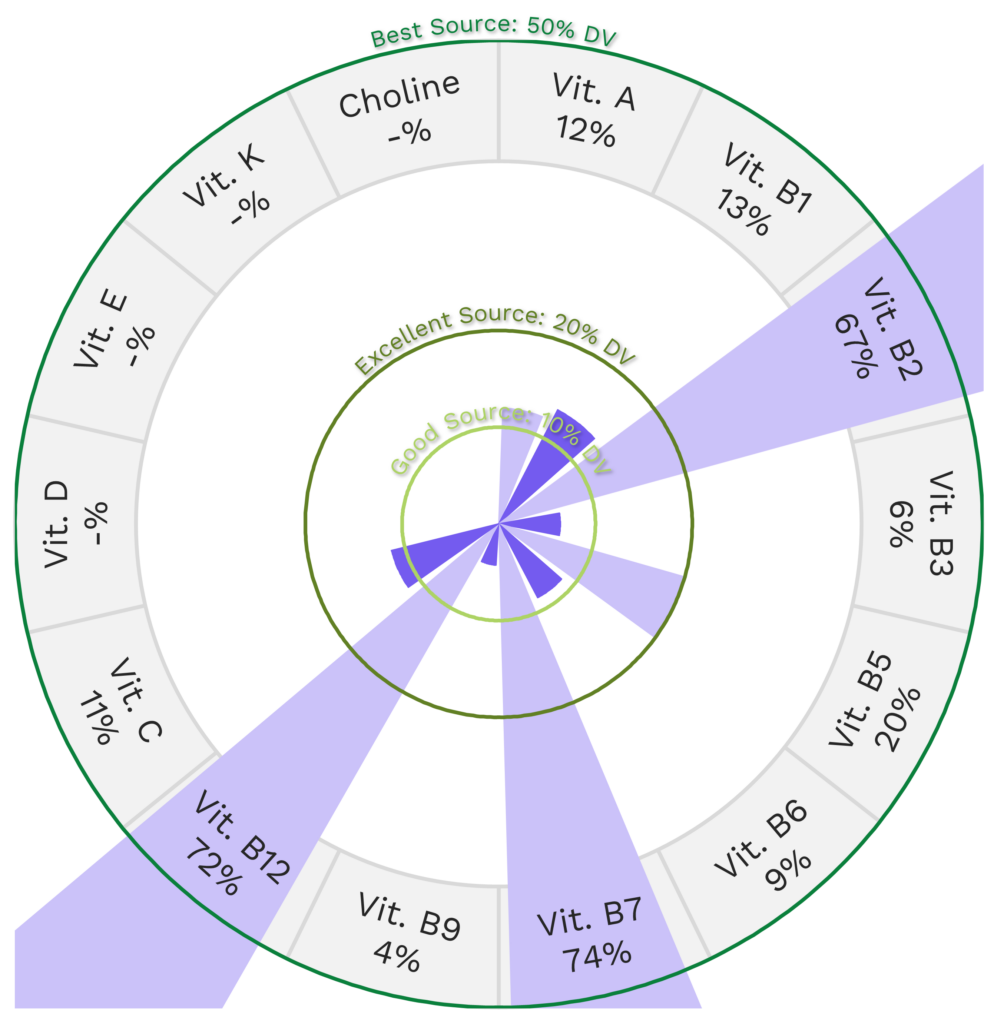
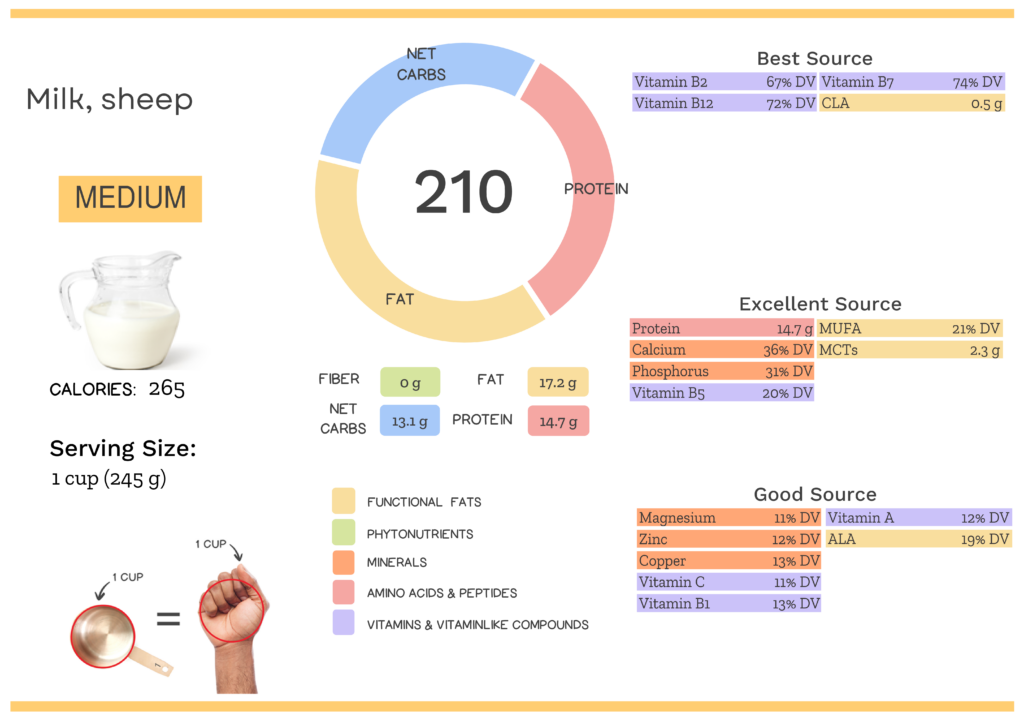
Milk Nutrition Varies With Type
There are many different types of milk, which can be used in place of, or in addition to standard cow’s milk. These will vary in taste and Nutrivore Score. Choose the ones you like, have access to, and can afford. They all have nutrients.
| NUTRIVORE SCORE | |
|---|---|
| Almond milk, unsweetened | 7441 |
| Breast milk | 147 |
| Coconut milk, canned | 184 |
| Cow milk, whole, 3.25% milk fat | 202 |
| Goat milk (with added vitamin D) | 1781 |
| Rice milk, unsweetened | 234 |
| Sheep milk | 2102 |
| Soy milk, unsweetened | 4252 |
Are you udderly impressed by all the nutrition in milk? Maybe your friends will be too!
Health Benefits of Sheep Milk Nutrients
Let’s take a closer look at all of the best and excellent source of nutrients found in a 1-cup serving of sheep milk and see how they benefit our health.
Sheep Milk Provides 74% DV Vitamin B7 (Biotin)
Sheep milk is a best source of vitamin B7 (biotin), providing 74% of the daily value per 1-cup serving!
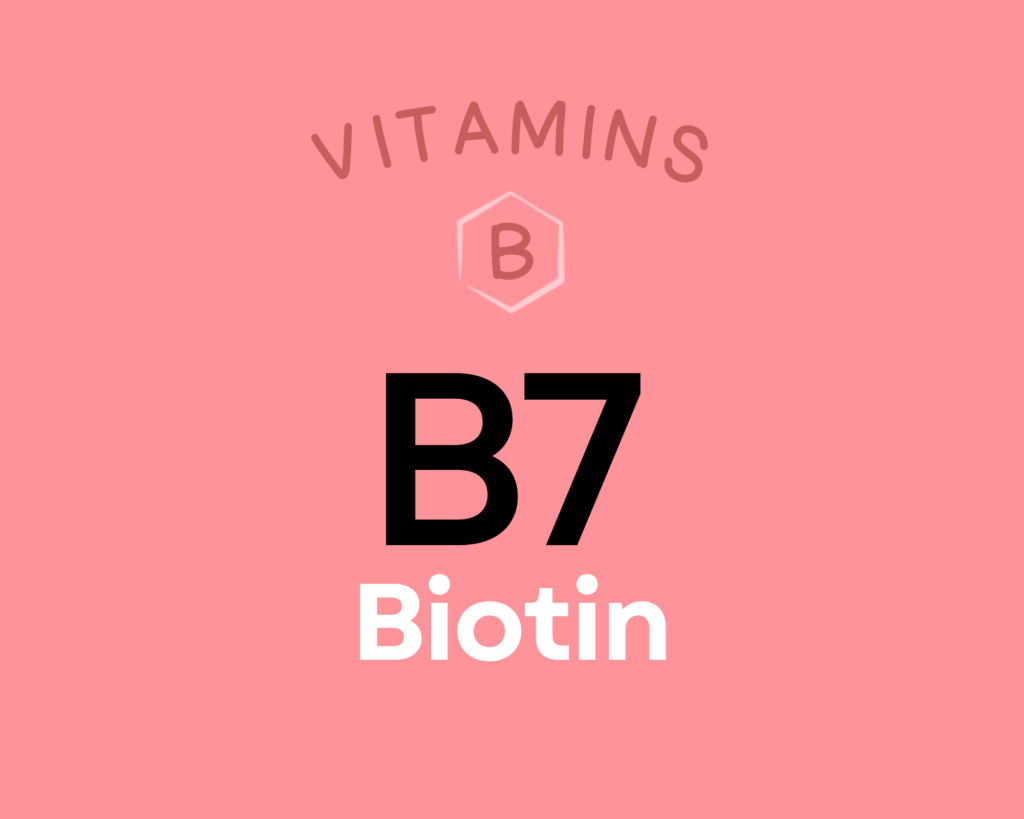
Biotin is a water-soluble B vitamin, also known as vitamin B7. Like other B vitamins, it plays an important role in energy metabolism (serving as a coenzyme for five carboxylase enzymes), neurotransmitter production, cellular function, and the function of various organs. Getting enough biotin can help support healthy nail and hair growth. It’s also particularly important during pregnancy, with low intakes increasing the risk of premature delivery and birth defects. There’s even some evidence biotin can benefit diabetics and reduce functional disabilities in people with multiple sclerosis. Learn more about biotin here.
Sheep Milk Provides 72% DV Vitamin B12 (Cobalamin)
Sheep milk is also a best source of vitamin B12 (cobalamin), providing 72% of the daily value per 1-cup serving!
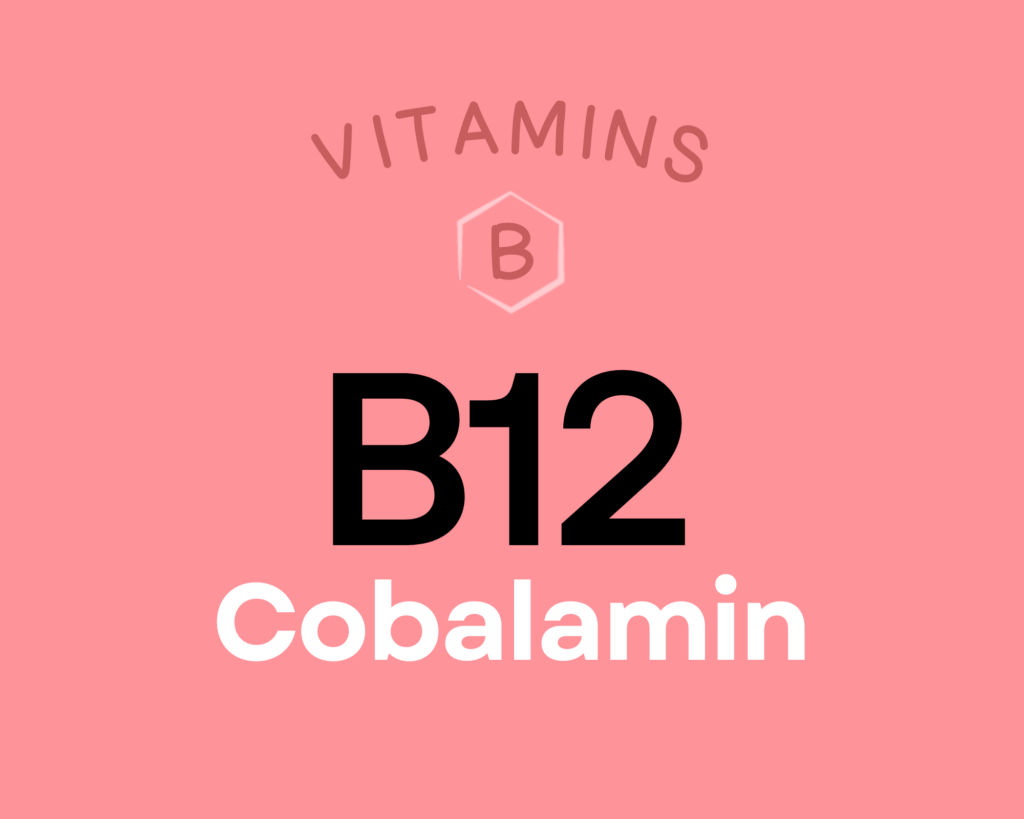
Vitamin B12 (cobalamin) is a water-soluble vitamin that serves as a cofactor for enzymes involved in energy metabolism, red blood cell production, DNA synthesis, neurotransmitter production, nervous system health, and folate metabolism. As a result of these roles, vitamin B12 is vital for maintaining brain and nervous system health, and may have a protective effect against dementia, Alzheimer’s disease, and depression. There’s also some evidence vitamin B12 may be cancer-protective, possibly through supporting folate metabolism (which then assists in repairing DNA damage). Learn more about vitamin B12 here.
Sheep Milk Provides 0.5 g of Conjugated Linoleic Acid (CLA)
Sheep milk is a best source of conjugated linoleic acid (CLA), providing 0.5 g of conjugated linoleic acid (CLA) per 1-cup serving!
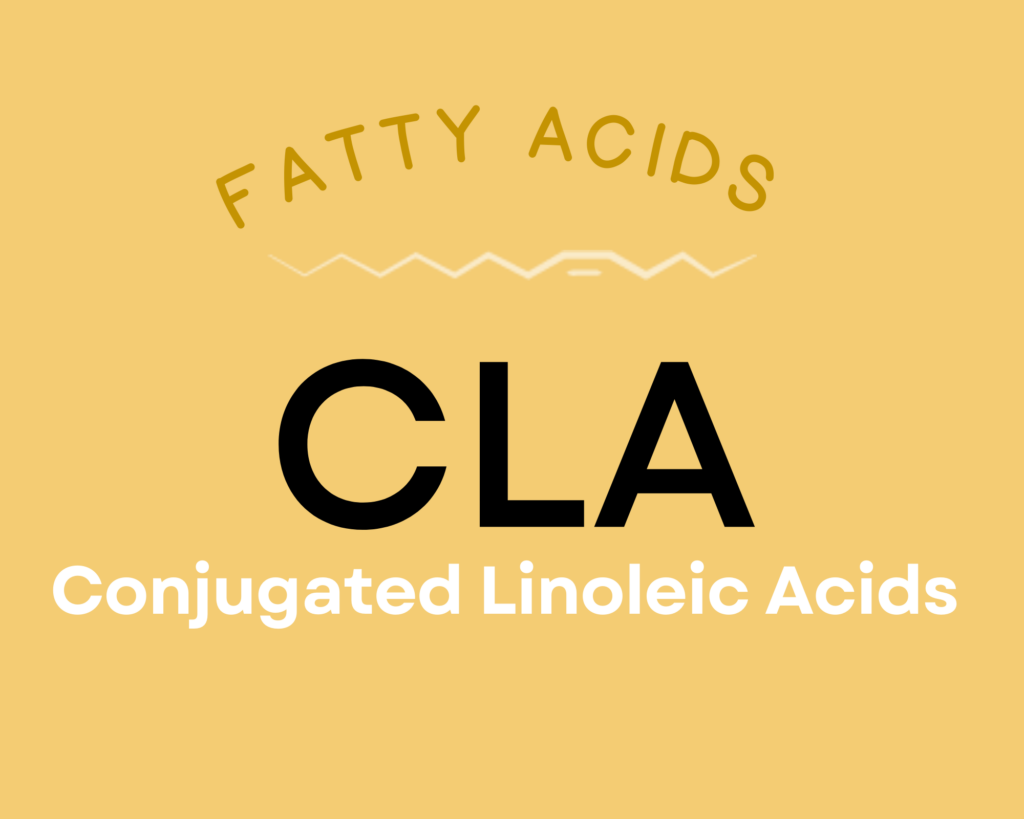
Conjugated linoleic acid (CLA) is an omega-6 fatty acid mostly found in meat and dairy products from grass-fed animals. Despite technically being a trans fat, CLA exhibits a range of beneficial health properties, including anti-cancer, anti-obesity, anti-diabetes, and anti-heart disease activities. It also promotes gut health and immune function. Learn more about CLA here.
Sheep Milk Provides 67% DV Vitamin B2 (Riboflavin)
Sheep milk is also a best source of vitamin B2 (riboflavin), providing 67% of the daily value per 1-cup serving!
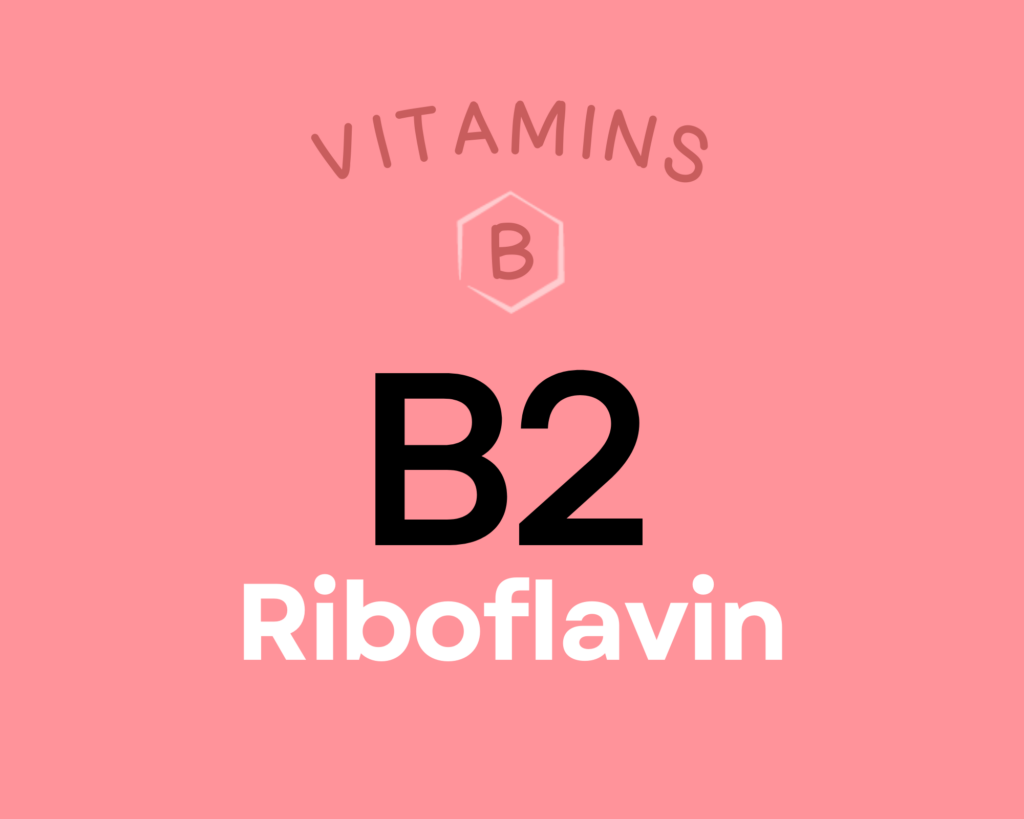
Riboflavin (or vitamin B2) is a vitamin that helps form two important coenzymes involved in oxidation-reduction reactions: flavin mononucleotide (FMN), and flavin adenine dinucleotide (FAD). Collectively, these coenzymes are involved in antibody production, energy production, growth and development, skin and hair health, and the metabolism of several other nutrients (vitamin B6, niacin, folate, and iron). Research suggests a role for riboflavin in preventing or treating migraine headaches, cardiovascular disease, cataracts, and preeclampsia during pregnancy. It also possesses some anti-cancer properties due to its involvement in folate metabolism and MTHFR activity. Learn more about vitamin B2 here.
Sheep Milk Provides 2.3 g of Medium Chain Triglycerides (MCTs)
Sheep milk is an excellent source of medium chain triglycerides (MCTs), providing 2.3 g of medium chain triglycerides (MCTs) per 1-cup serving!
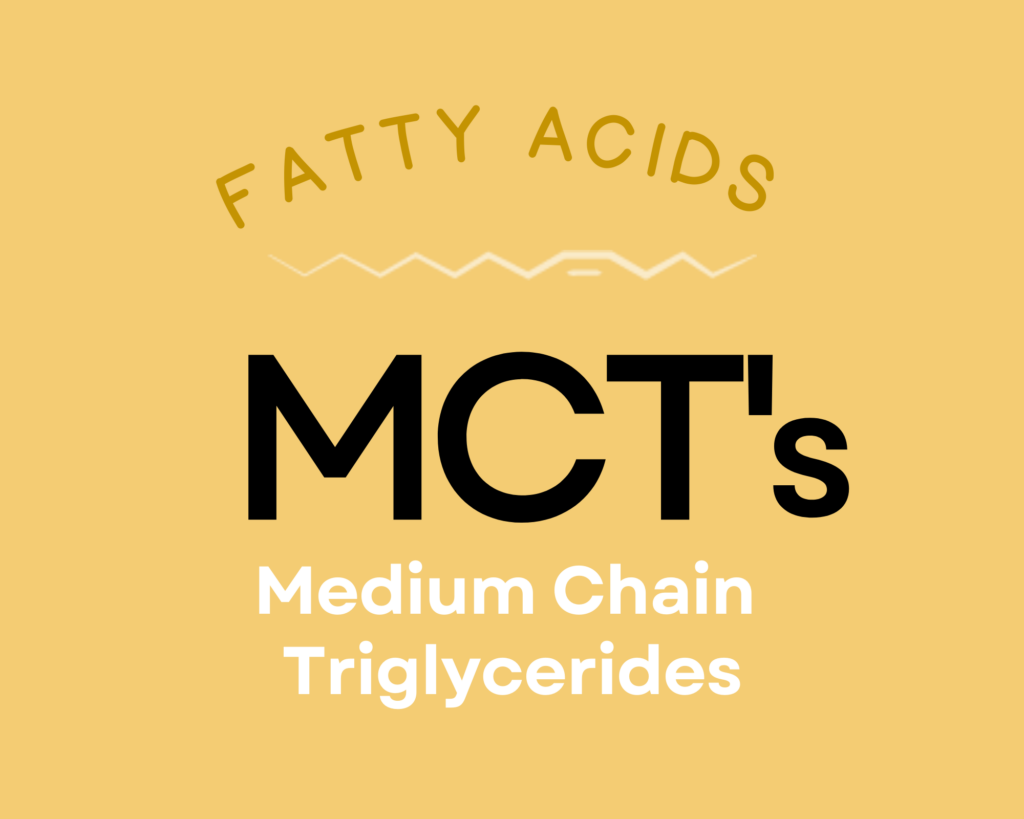
Medium-chain triglycerides (MCTs) are a type of saturated fat composed of at least two medium-chain fatty acids. Their exceptionally rapid and direct absorption (straight from the intestine to the liver) allows them to be quickly burned for fuel. The earliest use of MCTs was to help treat epilepsy, but they also possess benefits for weight loss and body composition—including by spontaneously reducing appetite and food intake, and by increasing resting energy expenditure via thermogenesis (heat production). MCTs may also help increase insulin sensitivity among diabetics, improve memory and cognition in Alzheimer’s patients, improve exercise performance, and boost gut health. Learn more about MCTs here.
Sheep Milk Provides 36% DV Calcium
Sheep milk is also an excellent source of calcium, providing 36% of the daily value per 1-cup serving!
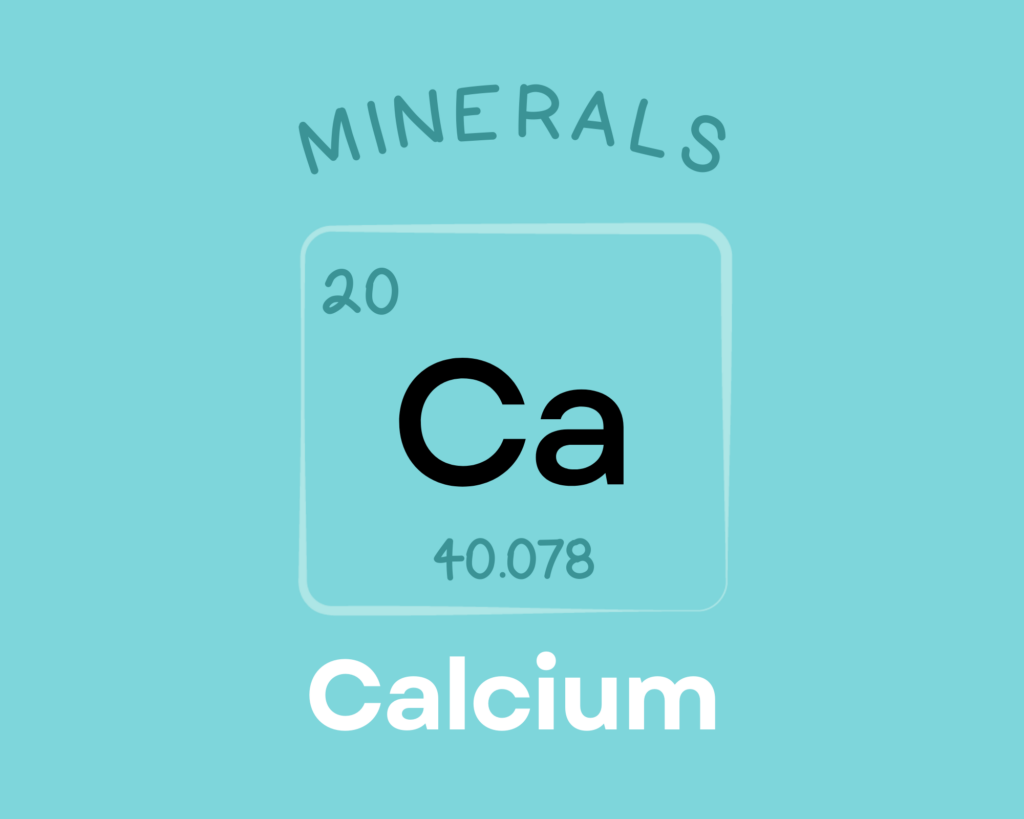
Calcium is a major structural component of bones and teeth, and also serves as an electrolyte—a type of electricity-conducting mineral needed for regulating nerve impulses, muscle contraction (including the heartbeat), blood pH, and fluid balance. Getting enough calcium helps protect against osteoporosis and bone fractures, while also potentially reducing the risk of colorectal cancer, pregnancy-related high blood pressure, and kidney stones. It may even help improve PMS symptoms and assist in body weight regulation! Learn more about calcium here.
Sheep Milk Provides 31% DV Phosphorus
Sheep milk is an excellent source of phosphorus, providing 31% of the daily value per 1-cup serving!
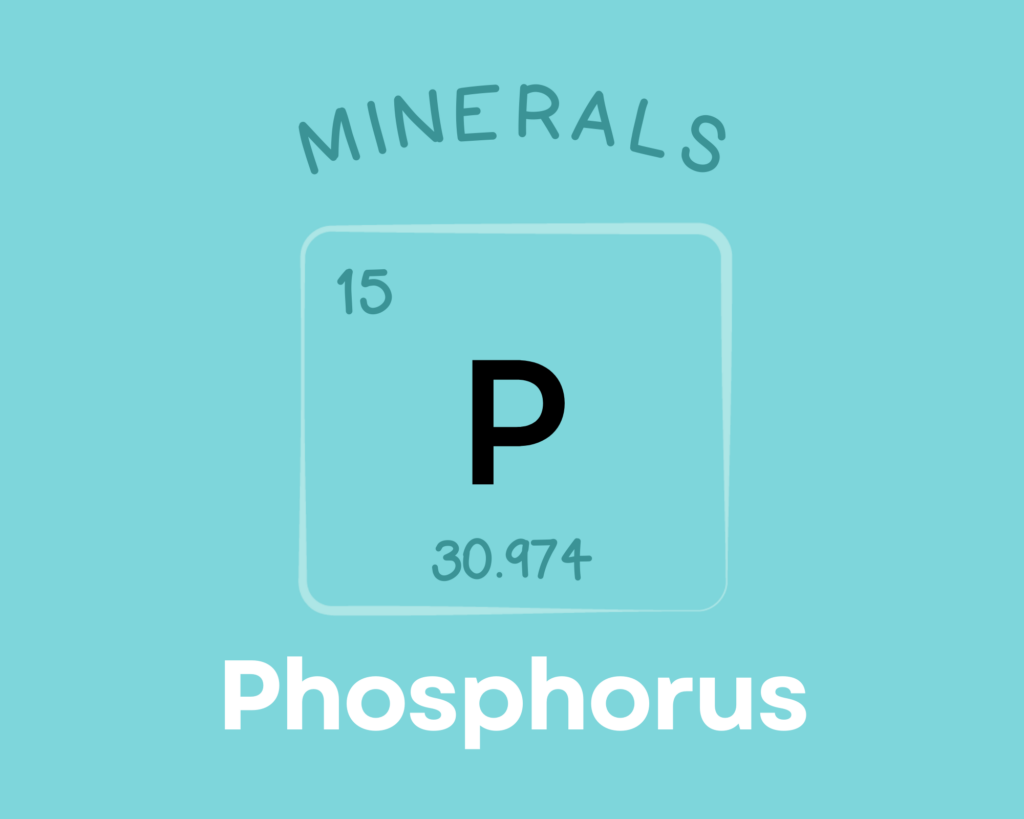
Phosphorus is an essential mineral that makes up about 1% of the total weight of the human body. Along with serving an important structural role for building nucleic acids and cell membranes, phosphorus is involved in numerous biological processes—including acid-base regulation, energy production, cell signaling, and bone mineralization. Excess phosphorus has been linked to a higher risk of cardiovascular disease, fractures, and osteoporosis, especially in the context of a low-calcium diet. Learn more about phosphorus here.
Sheep Milk Provides 14.7 g of Protein
Sheep milk is also an excellent source of protein, providing 14.7 g of protein per 1-cup serving!
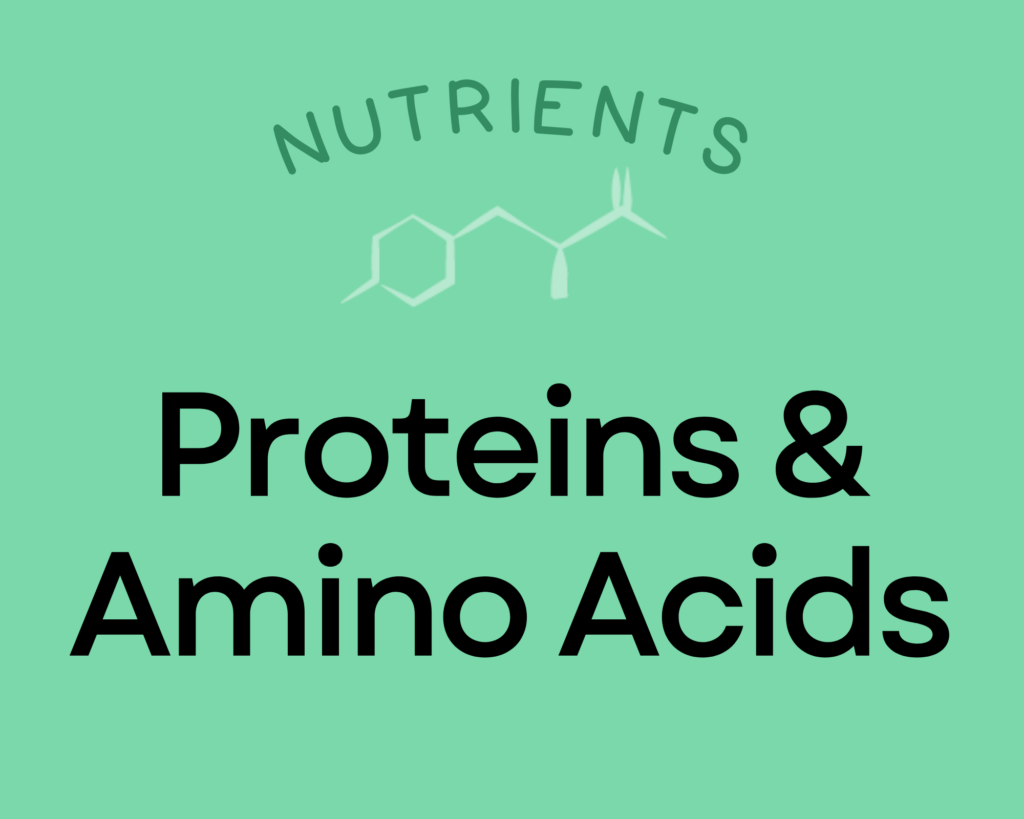
Proteins are the molecules that actually perform most of the various functions of life. In addition to being major structural components of cells and tissues, they have incredibly diverse roles from driving chemical reactions (e.g., enzymes) to signaling (e.g., some types of hormones) to transporting and storing nutrients. Dietary protein is necessary to supply the amino acid building blocks for all of the proteins in our bodies. The recommended daily allowance of protein is 0.36 grams per pound body weight (0.8 grams per kilogram of body weight). That amounts to 56 grams for a 150-pound person. However, it’s important to emphasize that this number is considered a minimum daily allotment, and there is no established upper limit. In fact, many studies have evaluated diets containing three to four times more protein than this minimum and proven benefits to weight management, body composition, hormone regulation, and cardiovascular health. These studies suggest that an optimal protein intake for most people is probably in the range of 1.2 to 1.8 grams per kilogram bodyweight (82 to 122 grams for that same 150-pound person), and that people who are very active may see the best results at even higher intake. Learn more about protein and amino acids here.
Sheep Milk Provides 21% DV Monounsaturated Fatty Acids (MUFAs)
Sheep milk is an excellent source of monounsaturated fatty acids (MUFAs), providing 21% of the daily value per 1-cup serving!
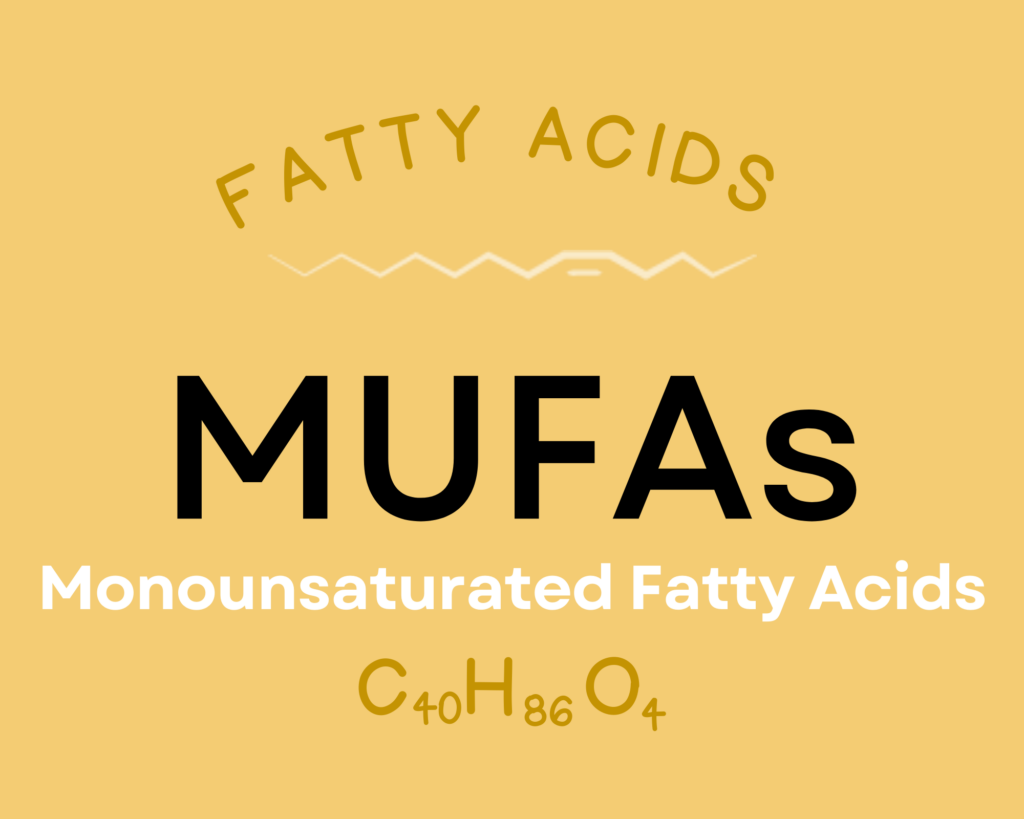
Monounsaturated fatty acids (MUFA), the most abundant of which is oleic acid, play an important role in cellular function due to its presence in phospholipids in cell membranes. Oleic acid is beneficial for cardiovascular health—both in reducing risk factors like high blood pressure, cholesterol, triglycerides, inflammation, and oxidative stress, and in reducing actual cardiovascular disease incidence and events. Oleic acid has even demonstrated anti-cancer activity, with an ability to inhibit the progression, proliferation, and metastasis of several types of cancer cells. Research shows this fat could benefit body weight regulation and obesity through its effects on energy metabolism and lipogenesis. In fact, human trials show that enriching diets with oleic acid leads to decreases in central obesity, abdominal fat, body weight, and food intake, while also possibly increasing energy expenditure! Oleic acid also possesses some benefits for diabetics—influencing genes and pathways involved in insulin signaling and glucose metabolism, as well as helping protect against some complications of diabetes, like diabetic retinopathy and atherosclerosis. Learn more about oleic acid here.
Sheep Milk Provides 20% DV Vitamin B5 (Pantothenic Acid)
Sheep milk is also an excellent source of vitamin B5 (pantothenic acid), providing 20% of the daily value per 1-cup serving!

Pantothenic acid (or vitamin B5) is a water-soluble vitamin that serves as a cofactor for coenzyme A—which itself is critical for metabolizing many drugs and toxins, as well as forming derivatives (acetyl-CoA and succinyl-CoA) that participate in the synthesis of cholesterol, fatty acids, melatonin, the neurotransmitter acetylcholine, steroid hormones, heme, and vitamins A and D. Coenzyme A is also needed in the Krebs cycle, giving pantothenic acid a role in energy metabolism. Research suggests that a pantothenic acid derivative (pantethine) can help improve blood lipid profiles and reduce fatty streak formation and lipid deposition in the arteries, giving it a cardio-protective role. Additional research shows that panthothenic acid can accelerate wound healing, boost cellular production of the important antioxidant glutathione, and possibly help improve symptoms of rheumatoid arthritis. Learn more about vitamin B5 here.
Learn What Foods Are the Best Sources of Every Nutrient
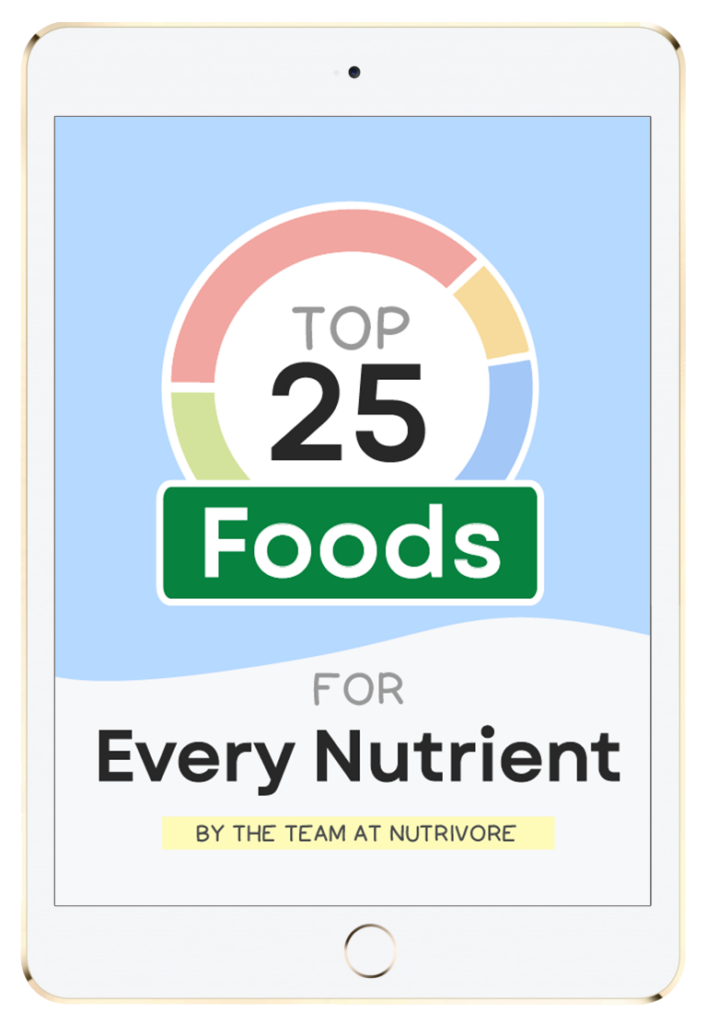
The Top 25 Foods for Every Nutrient
The Top 25 Foods for Every Nutrient e-book is a well-organized, easy-to-use, grocery store-friendly guide to help you choose foods that fit your needs of 43 important nutrients while creating a balanced nutrient-dense diet.
Get two “Top 25” food lists for each nutrient, plus you’ll find RDA charts for everyone, informative visuals, fun facts, serving sizes and the 58 foods that are Nutrient Super Stars!
Buy now for instant digital access.
How Much Sheep Milk Should We Drink Per Day?
While dairy products may not be the most nutrient-dense foods, they are a “grate” source of calcium in addition to containing a range of other nutrients, all the while being a complete protein – “whey” better than you thought, huh?
Studies show a good target for most people is two servings of dairy products daily, with the most benefits coming from fermented versions like yogurt or kefir.
A 2021 meta-analysis of 55 prospective cohort studies found that dairy consumption in general was associated with a 10% lower risk of stroke, a 4% lower risk of coronary heart disease, and a 9% reduced risk of hypertension (high blood pressure). A 2016 meta-analysis of 29 cohort studies showed that cheese reduced cardiovascular disease risk, and fermented dairy reduced total mortality risk, albeit by a very modest amount (2% per 20 gram serving of fermented dairy or 10 gram serving of cheese). Importantly, a 2017 meta-analysis revealed a U-shaped dose response curve for dairy products, with intake up to about 400 grams daily modestly reducing all-cause mortality (again, only about a 2% effect), but higher consumption levels no longer being beneficial—intake greater than 1000 grams per day was associated with a 15% increased risk of total mortality.
A serving of milk or yogurt is 1 cup (8 ounces, or 250mL) and a serving of cheese is 1.5 ounces (about 42 grams). Learn more about dairy products here.
Easily track your servings of Nutrivore Foundational Foods!
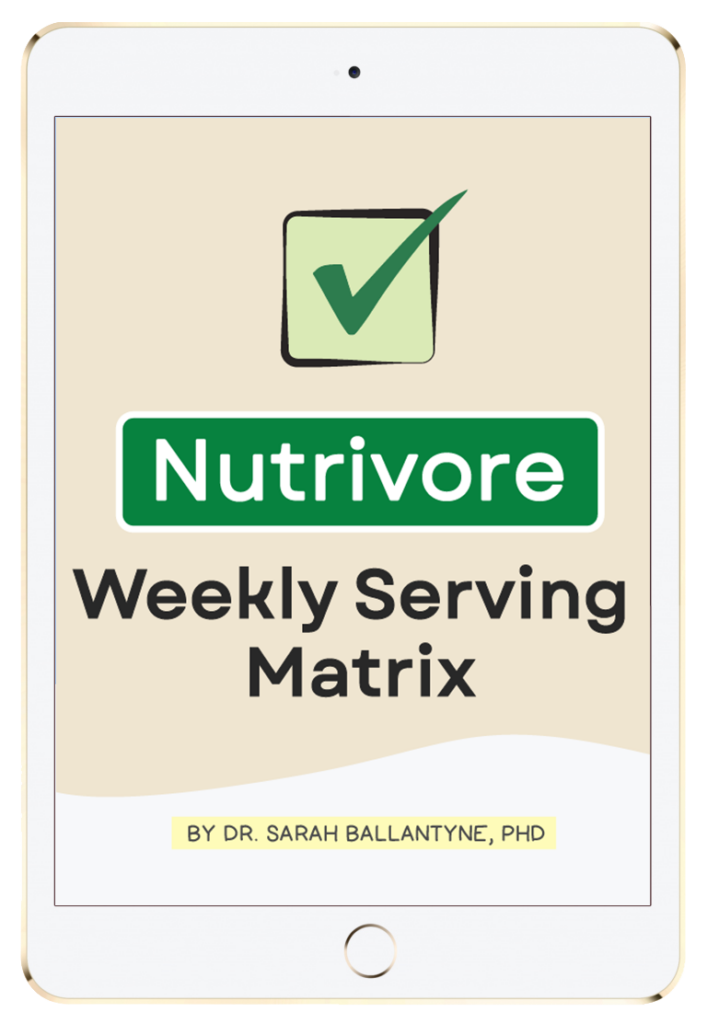
The Nutrivore Weekly Serving Matrix
The Nutrivore Weekly Serving Matrix digital resource is an easy-to-use and flexible weekly checklist designed to help you maximize nutrient-density and meet serving suggestions of Nutrivore foundational foods, all without having to weigh or measure your foods!
Includes a 22-page instructional guide and downloadable interactive guides.
Buy now for instant digital access.
cITATIONS
Expand to see all scientific references for this article.
Guo M. “Lipids and Lipid Related Functional Foods.” Functional Foods: Principles and Technology, edited by Mingro Guo, Woodhead Publishing, 2009. Ch 5: 161-196.
Kubo H, Fujii K, Kawabe T, Matsumoto S, Kishida H, Hosoe K. Food content of ubiquinol-10 and ubiquinone-10 in the Japanese diet. Journal of Food Composition and Analysis. 2008. Vol 21(3):199-210. https://doi.org/10.1016/j.jfca.2007.10.003.
USDA Food Central Database: Milk, sheep, fluid
Watanabe T, Kioka M, Fukushima A, Morimoto M, Sawamura H. Biotin content table of select foods and biotin intake in Japanese. Int J Anal Bio-Sci. 2014. Vol 2(4):109-125.
Wójcik OP, Koenig KL, Zeleniuch-Jacquotte A, Costa M, Chen Y. The potential protective effects of taurine on coronary heart disease. Atherosclerosis. 2010 Jan;208(1):19-25. doi: 10.1016/j.atherosclerosis.2009.06.002. Epub 2009 Jun 11. PMID: 19592001; PMCID: PMC2813349.


